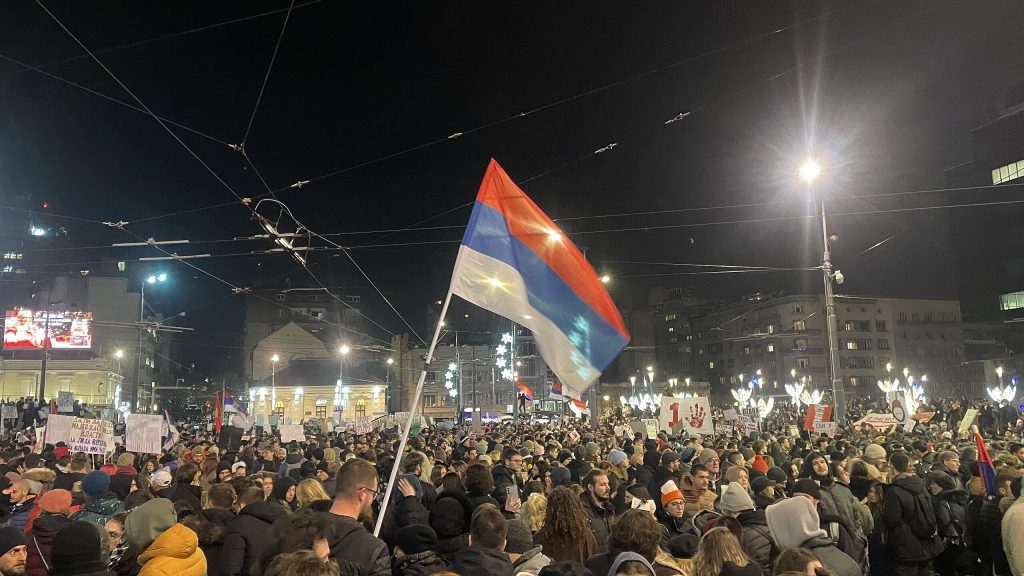One man, One state: Vučić and Serbia’s Student Protests
A railway station tragedy has ignited Serbia’s largest student-led protests in decades, uniting a new generation against years of democratic backsliding. As President Aleksandar Vučić faces unprecedented electoral vulnerability, mutual distrust between students and opposition parties could determine whether the movement sparks lasting political change – or fades before its moment arrives.
The ongoing student protests in Serbia have taken society by surprise, significantly reshaping the political landscape. They represent the most serious challenge yet to President Aleksandar Vučić’s regime, which has presided over years of steady democratic backsliding. While the regime is unlikely to collapse directly under the pressure of the protesters, it has been rendered electorally vulnerable for the first time since coming to power in 2012.
The student protests started in late 2024 as a reaction to the collapse of a recently renovated railway station in the city of Novi Sad, which killed 16 people. The tragedy was widely perceived as a consequence of corruption and institutional failure. Weeks later, members of Vučić’s Serbian Progressive Party (SNS) physically assaulted a small group of peacefully protesting students. This act of violence triggered a wave of solidarity from other students, who disrupted lectures at their universities, marking the true beginning of the large-scale protests.
From Tragedy to Mass Mobilization
These were far from the first anti-government protests in recent years. This time, however, the unexpected mobilization of Generation Z – previously seen as largely disengaged politically – quickly sparked optimism among government critics. The student-led protests shattered turnout records, and a new social movement coalesced around them, complete with distinctive symbols, iconography, and a clear mission: to restore the rule of law and democracy in Serbia.
Since 2012, these values have been endangered Vučić’s increasingly authoritarian rule. The Transformation Index BTI has noted a steady decline in the quality of elections, for instance. While opposition parties can still participate, the playing field is increasingly tilted in favor of Vučić’s SNS. Same goes for the media, where ownership is increasingly concentrated in the hands of figures close to the ruling elite, which has left all national television stations pro-government. Moreover, the BTI has also recorded declines in several other key indicators: freedom of expression (down to 3 from a previous 4 out of 10), association and assembly rights and independent judiciary (both down to 5 from a previous 6 out of 10).
The optimism sparked by the student movement early this year led to unrealistic expectations that the regime’s collapse was imminent. However, the security apparatus and clientelist networks remained loyal to Vučić. The leaderless nature of the movement may have contributed, as there were no obvious figures with whom potential defectors could negotiate.
Hope Meets Political Reality
Since the student movement called for snap elections in early May and announced it would back a parliamentary list, attention shifted to the ballot box as the only viable route to unseating Vučić – with hopes that the margin of victory would be large enough to prevent election manipulation. There are reasons for cautious optimism: for the first time since 2012, the SNS appears electorally vulnerable. Independent polls have recorded growing public dissatisfaction with the government and rising disapproval of Vučić personally. While the party’s core base remains loyal, many previously undecided or disengaged citizens have turned against the regime. Two June local elections in June saw record turnout and a surge in opposition support, while a July Spring Insight poll found potential parliamentary turnout could be the highest in nearly 20 years.
Yet challenges remain. Mainstream opposition parties have long been fragmented and seen as ineffective, causing many opposition-leaning voters to lose confidence. As a result, most now say they would back a yet-undefined parliamentary list supported by the student movement, which – according to its leaders – would feature respected public figures without party affiliations.
The students, wary of political co-optation, refuse to cooperate directly with opposition parties, fearing their movement could be “hijacked.” Opposition leaders, for their part, worry the students’ popularity could push them out of parliament – and political relevance. This mutual mistrust is likely to persist, weakening a unified front against the regime.
The Road to the Ballot Box – and Beyond
Vučić could also delay the vote until the legal deadline, which requires elections to be held by the end of 2027. However, this would be a double-edged sword: Extra time could deepen divisions among his opponents, but it could also further weaken his regime, which has shown signs of fatigue and declining cohesion since last November. The appetite for political change is growing, and the SNS seems unable to craft a compelling narrative to reverse the trend.
Whenever the elections take place, the regime is expected to use the time to tighten its grip on power by escalating authoritarian measures, particularly against independent media and civil society. Given global trends of declining support for such institutions – and a government already willing to use pressure and harassment, especially since the protests began – their position is precarious. While Vučić is unlikely to turn Serbia into another Belarus, which would require drastic measures likely to provoke backlash at home and from the European Union, he is fully capable of further eroding the foundations of liberal democracy.

